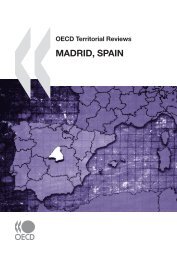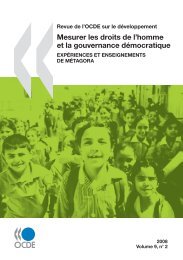Evaluating Country Programmes - OECD Online Bookshop
Evaluating Country Programmes - OECD Online Bookshop
Evaluating Country Programmes - OECD Online Bookshop
You also want an ePaper? Increase the reach of your titles
YUMPU automatically turns print PDFs into web optimized ePapers that Google loves.
<strong>OECD</strong> 1999<br />
<strong>Country</strong> Programme Planning and <strong>Country</strong> Programme Evaluation within SDC<br />
participants felt that the recommendations of external evaluations were taken less<br />
into account in the country programmes than the results of the self-evaluation processes.<br />
Three reasons were given:<br />
– The external evaluations did not acquire a sufficiently deep understanding<br />
of the programme, got stuck on detail, and/or the recommendations were too<br />
general.<br />
– The ownership by the persons concerned was missing.<br />
– And the policy framework for country programme was already determined.<br />
In general, short self-evaluation processes accompanied by external facilitators<br />
were considered as most efficient and effective. The recommendations of selfevaluations<br />
were thought to be optimal inputs in planning exercises with a high<br />
degree of SDC ownership. A proposal for a possible linkage of self-evaluation processes<br />
with external evaluations was to evaluate first externally the different sectors<br />
of a country programme and then to use these evaluations as inputs for a selfevaluation<br />
workshop.<br />
In general, it is the co-ordination office which leads the evaluations. Only the<br />
final stages of the process may be more strongly determined by headquarters. It<br />
is different for the programmes in Eastern Europe where the desk officers are<br />
closely involved due to the recent opening of co-ordination offices in the Eastern<br />
European partner countries. In Madagascar, where a phasing-out was decided,<br />
there was a division of labour: the evaluation of parts of the programme was under<br />
the responsibility of the co-ordination office, while the foundations for the decision<br />
were outlined in a paper elaborated in co-operation with headquarters. The<br />
distribution of the roles is not only related to the kind of decisions to be taken,<br />
but is also a flexible arrangement considering the different degrees of operational/conceptual<br />
experience found at the two ends of the country programme<br />
(Desk Officer – Co-ordination Office). Depending on the Geographical Division,<br />
the processes take place in an inductive or deductive manner. 8<br />
The following tendencies can be observed in SDC:<br />
– The West Africa Division is a good example of a creative bottom-up approach<br />
for needs assessment, formulation of demands by the partners, and their<br />
integration into the country programme. 9<br />
– On the other side of the spectrum, the Latin America Division goes in the<br />
direction of a highly structured deductive approach since it has developed a<br />
whole system of inter-linked management instruments. 10<br />
– The two Asia Divisions as well as the East Africa Division can be characterised<br />
between these two accentuated approaches. The Asia I Division was actually<br />
the pioneer in the standardisation of the country programme process. Now it<br />
works on simplifying the processes and introducing a strongly value-oriented<br />
approach.<br />
221

















![CQE=U]^\]Z: KAZAKHSTAN - OECD Online Bookshop](https://img.yumpu.com/3915768/1/190x253/cqeuz-kazakhstan-oecd-online-bookshop.jpg?quality=85)